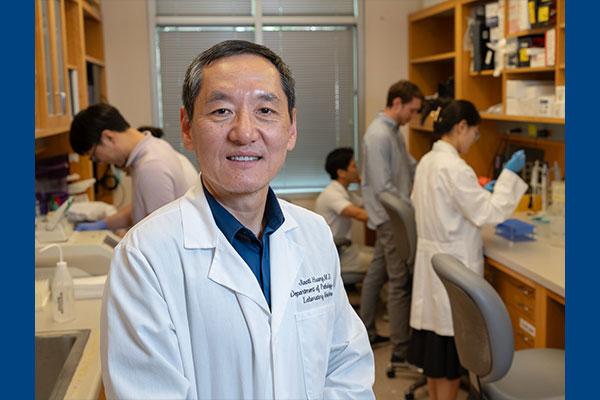
On Dec. 9, 2024, Johnston-West Endowed Chair of Pathology Jiaoti Huang, MD, PhD, gave a grand rounds talk at Northwestern University Feinberg School of Medicine, titled “Cellular Heterogeneity Contributes to Therapy Resistance and Disease Progression of Prostate Cancer.” Huang discussed the research in his lab over the past 20 years studying the function and molecular mechanisms of neuroendocrine cells in relation to carcinogenesis, therapy response, and therapy resistance of prostate cancer.
He also discussed how his research has led to a National Institutes of Health (NIH)-sponsored clinical trial and a novel therapy target discovered recently in his lab.
The goal of the clinical trial is to study the combination of an experimental drug and medication in men with metastatic castration-resistant prostate cancer (mCRPC) who have failed currently available treatments.
Andrew Armstrong, MD, director of Research for the Duke Cancer Institute (DCI) Center for Prostate and Urologic Cancers, is leading the trial. In January 2024, the team co-led by Armstrong and Huang was awarded a $1 Million Challenge Award by the Prostate Cancer Foundation to support correlative studies associated with the trial. The two-year, $1 million award, titled “Targeting Neuroendocrine Cells in Prostate Cancer with Small Molecule and Targeted Radionuclide Therapies,” funds laboratory and clinical studies targeting two novel cell surface targets, CXCR2 and GPC3, respectively, that The Huang Lab discovered in advanced therapy-resistant prostate cancer.
Huang is an internationally renowned prostate cancer pathologist and researcher who has spent over two decades studying strategies for targeting neuroendocrine cells to improve prostate cancer treatment. His research has been funded at a high level by the federal government, private foundations, and industries.
“The one thing I love very much is my ability to do research,” said Huang. “I can help advance the field, and the results will benefit patients. Duke has a great infrastructure and a collaborative culture to perform cutting-edge research. I benefit from interacting with the many smart and caring people who work here. We have different clinical experiences and educational and research backgrounds. When we interact, novel ideas are born. For me that is very stimulating. It is very gratifying to see the needle move in a positive direction as a result.”